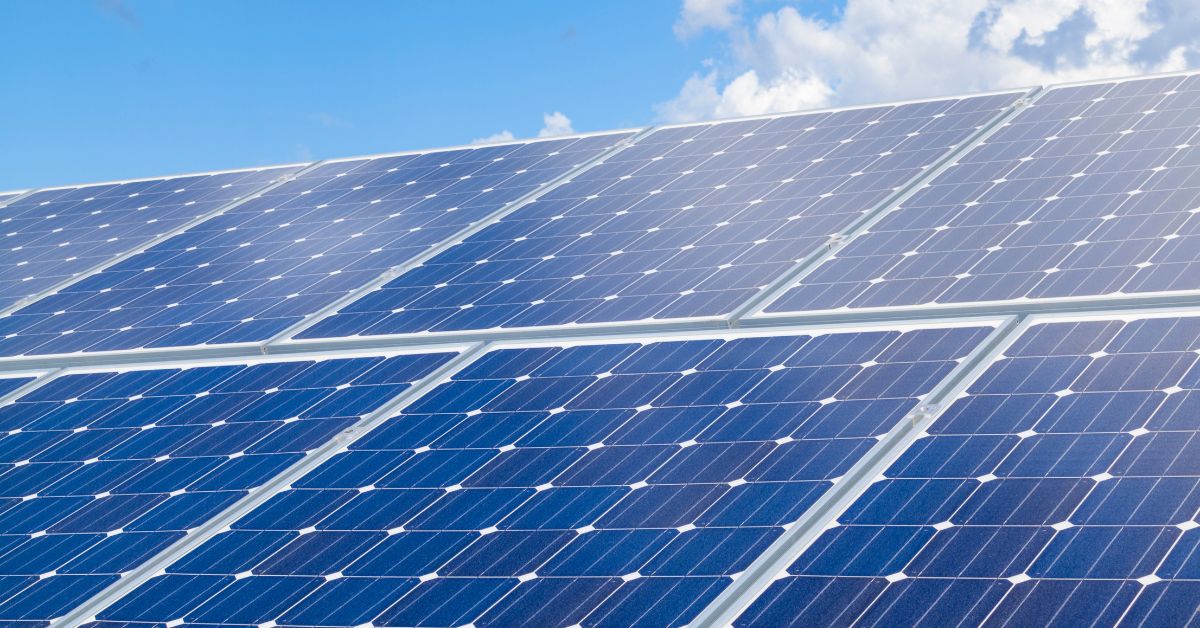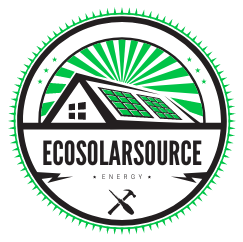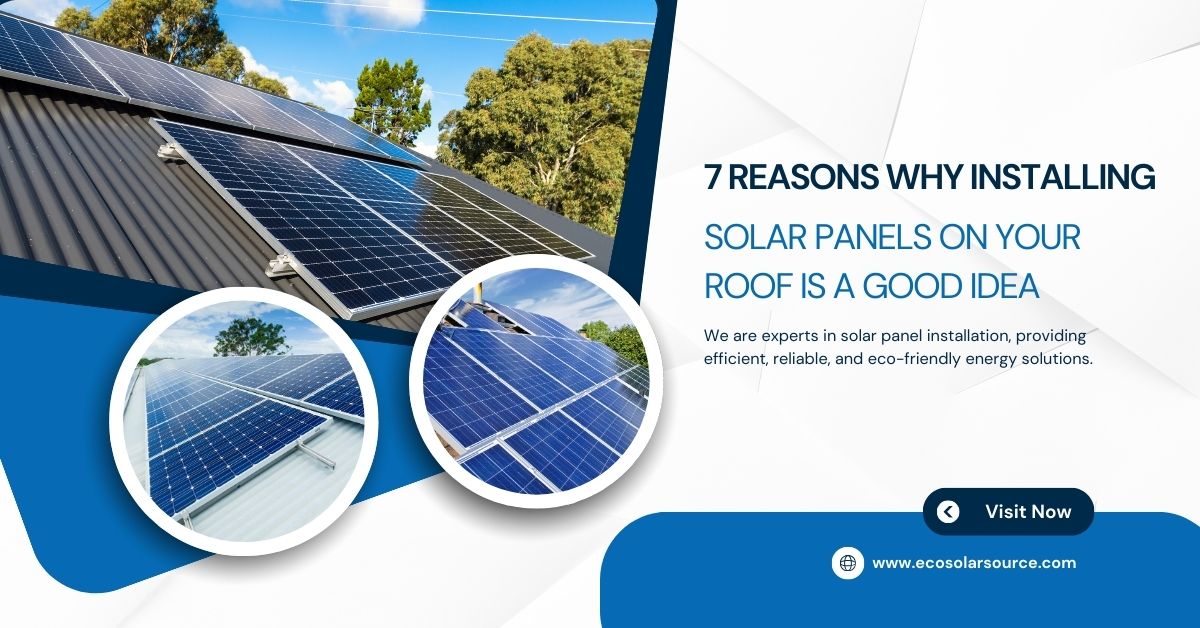7 Reasons Why Installing Solar Panels on Your Roof is a Good Idea
Know the details about the 7 Reasons Why Installing Solar Panels on Your Roof is a Good Idea, Installing solar panels on your roof offers numerous benefits. First, it reduces your energy bills by harnessing free sunlight. Second, it cuts your carbon footprint, making your home eco-friendlier. Third, solar panels increase your property value, attracting energy-conscious buyers.
Fourth, they provide energy independence, protecting you from rising utility costs. Fifth, many governments offer incentives, reducing upfront installation costs. Sixth, solar systems require low maintenance, lasting for decades with minimal upkeep. Lastly, investing in solar contributes to a sustainable future, promoting renewable energy and reducing reliance on fossil fuels. It’s a smart, long-term investment in both savings and sustainability.
Table of Contents
7 Reasons Why Installing Solar Panels on Your Roof is a Good Idea
The Solar energy has become an increasingly popular choice for a homeowners looking to reduce energy costs, lessen their environmental impact, and increase the value of their homes. The shift toward renewable energy sources has been driven by concerns about rising utility prices, climate change, and the desire for energy independence. Solar power, in particular, has emerged as a practical solution that not only benefits individual households but also contributes to global sustainability. Installing solar panels on your roof is a significant decision that brings with it a range of advantages. In this blog, we will explore seven reasons why installing solar panels on your roof is a good idea.
1. Reduce Your Energy Bills
One of the most compelling reasons to install solar panels is the potential for significant savings on your energy bills. Traditional energy sources, like coal and natural gas, are subject to fluctuating prices, leaving homeowners vulnerable to rising costs. Solar energy, on the other hand, is free and abundant. Once you’ve installed solar panels on your roof, you can harness the sun’s energy to power your home, significantly reducing or even eliminating your dependence on the grid.
How Solar Power Lowers Energy Costs
Solar panels convert sunlight into electricity, which you can use to power your appliances, lighting, and heating systems. During peak sunlight hours, solar panels can generate more electricity than you need. This excess energy can be sent back to the grid (in areas where net metering is available), earning you credits with your utility company. On cloudy days or at night, when your solar system isn’t producing electricity, you can draw power from the grid using the credits you’ve earned, further reducing your electricity costs.

Long-Term Financial Benefits
The financial benefits of solar panels extend beyond just monthly savings. While the initial investment in solar panels can be substantial, many homeowners find that they recoup their costs in as little as 5 to 10 years, depending on the size of the system and local electricity rates. After that, the energy your system produces is essentially free, allowing you to enjoy decades of savings. Some estimates suggest that homeowners can save tens of thousands of dollars over the lifetime of their solar panels.
Increase Your Home’s Value
Installing solar panels not only cuts energy costs but also adds significant value to your home. Studies have shown that homes with solar power systems tend to sell for more than comparable homes without them. Homebuyers today are increasingly eco-conscious and willing to pay a premium for properties that already have solar installations. A solar energy system is seen as a modern, desirable feature that offers long-term financial benefits and reduces reliance on traditional energy sources.
Solar Panels and Property Value
According to research from the National Renewable Energy Laboratory (NREL), every dollar saved on energy bills through solar energy increases the home’s value by $20. This means if your solar system saves you $500 annually, the value of your home could increase by $10,000. A study by Zillow found that the homes with solar panels sold for 4.1% more on average than homes without them. This can be a significant boost, especially in competitive housing markets where every little advantage counts.
Faster Home Sales
In addition to boosting your home’s value, having solar panels can help your property sell faster. Buyers are often drawn to homes with lower energy costs, especially in areas with high utility rates. A solar system represents a forward-thinking, energy-efficient home, which can make your property more attractive to potential buyers.
Environmental Benefits: Reduce Your Carbon Footprint
One of the most critical benefits of solar energy is its positive impact on the environment. Unlike traditional fossil fuels, solar power is a clean and renewable energy source. By switching to solar, you can significantly reduce your carbon footprint and contribute to the global effort to combat climate change.
Solar Energy vs. Fossil Fuels
The production of electricity using coal, oil, and natural gas releases large of amounts of carbon dioxide (CO2) and other greenhouse gases into the atmosphere. These emissions contribute to global warming, which has numerous harmful effects, including rising sea levels, more extreme weather events, and the loss of biodiversity. Solar power, on the other hand, generates electricity without producing any harmful emissions. According to the Environmental Protection Impact Agency (EPA), the average U.S. home powered by solar energy can reduce carbon emissions by about 3 to 4 tons annually, which is the equivalent of planting over 100 trees every year.
Sustainable Energy for Future Generations
By installing solar panels, you’re not just making a positive impact today—you’re investing in a sustainable future. Solar energy is renewable, meaning it will never run out, unlike fossil fuels, which are finite resources. By transitioning to solar power, you’re helping to reduce our reliance on depleting fossil fuels and encouraging the development of a more sustainable energy infrastructure.
Energy Independence
Energy independence is another significant advantage of solar power. The ability to generate your own electricity means you’re no longer solely reliant on utility companies or vulnerable to fluctuations in energy prices. Solar energy offers a form of independence that allows you to take control of your energy consumption and future-proof your home.
Offsetting Energy Price Increases
Electricity prices are expected to continue rising as demand for power increases and fossil fuel resources dwindle. By installing solar panels, you can protect yourself from these price increases. While the cost of grid electricity rises, the energy generated by your solar panels remains free after installation, allowing you to offset these increases and stabilize your energy expenses.
Battery Storage and Off-Grid Living
For those who want even greater independence, solar energy systems can be paired with battery storage to allow for energy use even when the sun isn’t shining or during power outages. While most homeowners remain connected to the grid, battery storage gives you the option to go completely off-grid if desired. This can be particularly beneficial in areas prone to blackouts or where the energy grid is unreliable.
Take Advantage of Financial Incentives and Tax Credits
Many governments and local authorities offer incentives to encourage homeowners to adopt solar energy. These incentives can significantly reduce the upfront costs of installing solar panels, making the transition to solar more affordable.

Federal Solar Investment Tax Credit (ITC)
In the United States, one of the most significant financial incentives for solar power is the federal Solar Investment Tax Credit (ITC). This credit was allows homeowners to deduct a percentage of their solar installation costs from their federal taxes. As of 2024, the tax credit stands at 30%, but it is set to phase out in the coming years unless extended by legislation. This means that homeowners who install solar panels sooner rather than later can benefit from the maximum tax credit.
State and Local Incentives
In addition to the federal tax credit, many states, municipalities, and utility companies offer incentives for solar power. These can include rebates, tax credits, and performance-based incentives. For example, some states have solar renewable energy credits (SRECs), which allow homeowners to earn additional income based on the amount of energy their solar panels produce. These incentives can significantly reduce the payback period for your solar investment, making solar power more accessible.
Low Maintenance and Durability
One of the reasons solar power systems are becoming so popular is that they require very little maintenance. Once installed, solar panels operate with minimal intervention, providing homeowners with a hassle-free source of energy for decades.
Minimal Upkeep
Solar panels have no moving parts, which means there’s very little that can go wrong. The most common form of maintenance is simply cleaning the panels a few times a year to remove dirt, dust, or debris that may accumulate. In most cases, rain will wash away most debris, but if you live in a particularly dry or dusty area, a professional cleaning or a DIY rinse with a hose can keep your panels operating efficiently.
Long Lifespan
Most solar panels come with warranties that guarantee their performance for 25 to 30 years, and many panels continue to operate effectively well beyond their warranty period. Even after several decades, solar panels typically retain about 80% of their original efficiency, making them a reliable long-term investment. Solar inverters, which convert the energy from your panels into usable electricity, may need replacement every 10 to 15 years, but overall, the maintenance and operational costs are minimal compared to other home energy systems.
Contribute to Energy Grid Stability
Solar energy isn’t just beneficial to individual homeowners—it also contributes to the stability of the overall energy grid. By producing clean energy and reducing the demand on the grid, solar power helps create a more resilient and reliable energy infrastructure.

Reducing Peak Demand
One of the challenges utility companies face is meeting peak demand, which usually occurs during the hottest part of the day when air conditioners are running at full capacity. Solar energy generation typically peaks during these same hours, meaning that homes with solar panels can help reduce the strain on the grid by generating electricity when it’s needed most. In some cases, this can help prevent blackouts and reduce the need for expensive, polluting backup power plants.
Supporting a Decentralized Energy System
Solar power also supports the development of a more decentralized energy system. Traditional energy grids are based on large power plants that distribute electricity over long distances, which can be inefficient and prone to outages. Solar power allows for the creation of more localized energy production, reducing the need for long transmission lines and making the grid more resilient to disruptions. In the long term, this could lead to a more sustainable and reliable energy system for everyone.
FAQs About 7 Reasons Why Installing Solar Panels on Your Roof is a Good Idea
Q1. How do solar panels reduce my energy bills?
Solar panels harness sunlight to generate electricity, reducing your dependence on the power grid. As you generate your electricity, your monthly energy bills can significantly decrease.
Q2. Will solar panels increase the value of my home?
Yes, homes with the solar panels often have higher property values. Potential buyers are attracted to homes with lower energy costs and a renewable energy system already installed.
Q3. How does using solar energy benefit the environment?
Solar energy is a clean, renewable resource. By installing solar panels, you reduce your carbon footprint, limit greenhouse gas emissions, and help combat climate change.
Q4. Are there financial incentives for installing the solar panels?
Yes, many countries offer tax credits, rebates, and grants for homeowners who install solar panels. These incentives can significantly reduce the upfront cost of the system.
Q5. Can solar panels still generate electricity on cloudy days?
Yes, solar panels can still generate electricity on cloudy days, although their efficiency may be lower compared to sunny days. They don’t need direct sunlight to work, just daylight.
Q6. How long will it take to recoup my investment in the solar panels?
The payback period depends on factors like your energy usage, the size of your solar system, and local electricity rates. On average, it takes 6-10 years to recoup the cost, after which you enjoy free electricity.
Q7. Will solar panels require a lot of maintenance?
The Solar panels are require very little maintenance. You may need to occasionally clean them to remove dust or debris and have a professional inspection every few years to ensure they’re operating efficiently.
Q8. If solar panels power my home during a blackout?
If your solar system includes battery storage, it can power your home during a blackout. Without a battery, most grid-tied systems will shut down for safety during outages.
Q9. Is my roof suitable for solar panels?
The suitability of your roof depends on factors like its orientation, angle, size, and condition. South-facing roofs are ideal in the northern hemisphere, while the roof should be structurally sound to support the panels.
Q10. What is net metering, and how does it work with the solar panels?
Net metering is a system where excess electricity generated by your solar panels is sent back to the grid. In return, you receive credits or payments from your utility, reducing your overall energy costs.
Q11. How do solar panels perform over time?
Solar panels degrade slightly over time but still maintain a high level of performance for 25 to 30 years. Most manufacturers offer warranties guaranteeing 80-90% efficiency after 20-25 years.
Q12. Can installing solar panels help me become energy-independent?
Yes, with a well-sized solar system and battery storage, you can significantly reduce or eliminate your reliance on the grid, making your home more energy-independent.
Q13. What’s the environmental payback time of solar panels?
The environmental payback time, or the time it takes for the energy savings to offset the energy used to manufacture and install the panels, is typically 1-3 years, after which they provide clean energy.
Q14. How does installing solar panels protect against rising energy costs?
By generating your electricity, you’re shielded from future increases in utility rates. The more energy prices rise, the more you save with solar power.
Q15. Can I install solar panels if I live in a cold or snowy climate?
Yes, solar panels work in cold climates and can even be more efficient in cooler temperatures. While snow may temporarily block sunlight, solar panels are designed to shed snow quickly and resume energy production.
Installing solar panels on your roof offers a host of benefits, from reducing your energy bills and increasing your home’s value to contributing to a cleaner, more sustainable future. With the availability of financial incentives and the long-term durability of solar systems, now is an excellent time to consider making the switch to solar power. Not only will you be doing your part to combat climate change, but you’ll also gain greater energy independence and enjoy the peace of mind that comes with lower utility costs.
Solar energy represents the future of power generation, and by installing solar panels, you’re investing in that future—both for yourself and for generations to come.
Click here to learn more about 7 Reasons Why Installing Solar Panels on Your Roof is a Good Idea
Click here to learn more about Solar Panel Subsidy in Rajasthan

